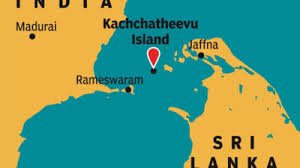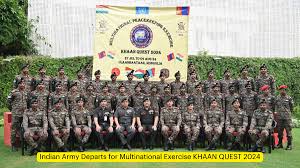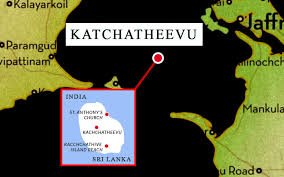Understanding Katchatheevu Island: A Historical Perspective
Katchatheevu Island, nestled in the Palk Strait between India and Sri Lanka, has been a subject of contention and historical significance for decades. Its rich history and strategic location make it a crucial point of discussion not only in diplomatic circles but also for aspirants preparing for various government exams. In this article, we delve into the historical context, importance, and key takeaways regarding Katchatheevu Island.

Why this News is Important:
Legal Implications: The Katchatheevu Agreement of 1974, which transferred the island’s control to Sri Lanka, has raised legal questions and debates regarding its validity under international law. Understanding the legal aspects of this agreement is crucial for aspirants preparing for civil service exams.
Diplomatic Relations: The issue of Katchatheevu Island has been a contentious issue between India and Sri Lanka, impacting diplomatic relations between the two countries. Aspirants aiming for diplomatic services should have a comprehensive understanding of this issue.
Historical Context:
Katchatheevu Island has a long and complex history, deeply intertwined with the maritime boundaries and political dynamics of the Indian subcontinent and Sri Lanka. Historically, the island was under the control of the Ramnad Kingdom, part of present-day Tamil Nadu, India. However, the island was ceded to Sri Lanka in 1974 through the Katchatheevu Agreement, sparking controversy and debate.
Key Takeaways from “Katchatheevu Island: A Historical Perspective”
| Serial Number | Key Takeaway |
|---|---|
| 1. | Katchatheevu Island’s history is intertwined with colonial legacies and bilateral agreements between India and Sri Lanka. |
| 2. | The island’s transfer in 1974 sparked debates over sovereignty, fishing rights, and maritime security in the region. |
| 3. | Indian fishermen have raised concerns about the impact of the agreement on their livelihoods and access to traditional fishing grounds. |
| 4. | Legal and diplomatic discussions continue regarding the validity of the agreement and the rights of Indian fishermen in the region. |
| 5. | Katchatheevu Island remains a symbol of the complexities and challenges in India-Sri Lanka relations, necessitating ongoing dialogue and resolution efforts. |
Important FAQs for Students from this News
Q1. What is the significance of Katchatheevu Island?
A1. Katchatheevu Island holds strategic importance due to its location in the Palk Strait, impacting maritime boundaries, fishing rights, and India-Sri Lanka relations.
Q2. Why was Katchatheevu transferred to Sri Lanka in 1974?
A2. Katchatheevu was transferred to Sri Lanka through a bilateral agreement between India and Sri Lanka, primarily to delineate maritime boundaries and resolve territorial disputes.
Q3. How has the transfer of Katchatheevu Island affected Indian fishermen?
A3. The transfer has impacted the traditional fishing rights of Indian fishermen, leading to disputes over access to fishing grounds and concerns about livelihoods.
Q4. Are there ongoing legal challenges regarding the transfer of Katchatheevu?
A4. Yes, debates continue regarding the legality of the agreement and the rights of Indian fishermen, with legal and diplomatic discussions underway.
Q5. What are the broader implications of the Katchatheevu dispute?
A5. The dispute reflects the complexities of India-Sri Lanka relations, influencing maritime security, diplomatic dialogue, and efforts towards conflict resolution.
Some Important Current Affairs Links














